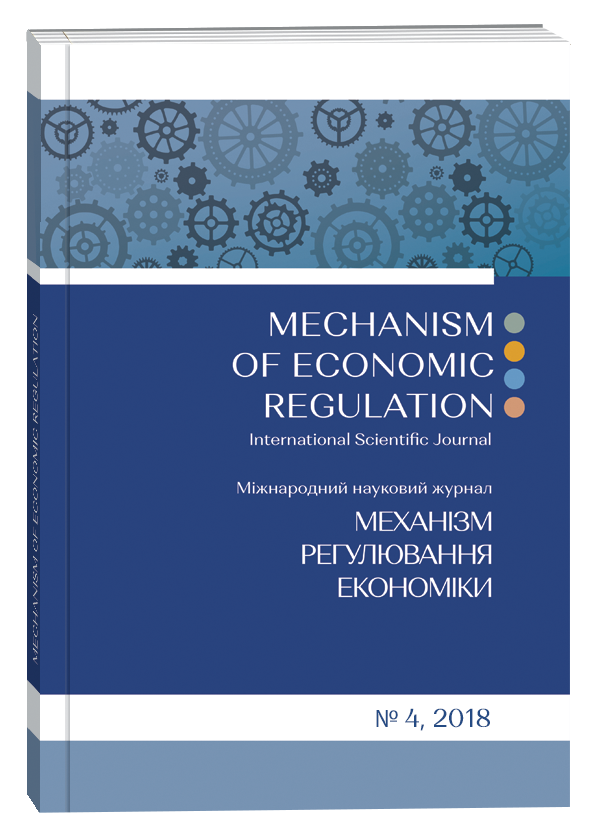EU ECONOMIC AND LEGISLATIVE POLICIES FOR INDUSTRIES 3.0 AND 4.0 PROMOTION
Abstract
The article analyses socio-economic and legislative mechanisms for ensuring the Third and Fourth Industrial Revolutions incorporating the EU experience. It tackles the studies of the origin of the Third and Fourth Industrial Revolutions. It overviews research progress in changing means of production, economic relations, human life style, basic needs and occupations, as well as many other attributes of life caused by the Third and Fourth Industrial Revolutions. These transformations demand legal bases of relevant laws and directives which are already adopted in the EU. The article explains how legislative instruments help ensuring the Third and Fourth Industrial Revolutions. It analyzes the most important functions that the cyber-physiological systems will have to perform without human intervention. The article shows the legislative framework for sustainable transport, agriculture, and construction. It investigates the EU experience on the creation of a pan-European transport space and sharp reduction of the negative environmental effects of transport, achieving by 2050 reduction of greenhouse gas emissions by 60 %. It explains how total bans on the use of motor transport by 2050 for such fuels as gasoline, diesel and other carbon fuels may foster green economy and sustainable development. The research demonstrates how sustainable agriculture integrates three main goals – environmental health, economic profitability, and social and economic equity. The article tackles the issues of sustainable settlements affects, which are realized through the creation of a livelong-friendly environment for ensuring a healthy human existence and its development, including social development; and reduction of the negative impact on the natural systems of the processes of creating and operating the settlements themselves.
References
Weizsäcker, E. (2013). Faktor pyat’. Formula ustoichivogo rosta. Doklad Rimskomu klubu [Factor five. The formula for sustainable growth: report of the Club of Rome]. AST-PRESS KNIGA.
Darguzhite, Zh. (2011). Belaya kniga transportnoy politiki YES vyzov dlya pe-revozchikov? [White Paper on EU Transport Policy Challenge for Transporters?]. Retrieved from http://www.cargonews.ua/aktualii/belaya-kniga-transportnoy-politiki-es-vyzov-dlya-perevozchikov/.
Melnyk, L. G. (2016). Teoriya razvitiya sistem [Systems Development Theory]. Saar Brücken, Germany: Palmarium Academic Publishing.
Nazarov, D. (2016). Chetvortaya promyshlennaya revolyutsiya: Internet veshchey, tsirkulyarnaya ekonomika i blokcheyn [Fourth Industrial Revolution: Internet of Things, Circular Economy and Blockchain]. Retrieved from http://www.furfur.me/furfur/changes/changes/216447-4-aya- promyshlennaya-revolyutsiya.
«Umnyy» dom proizvodit v 2 raza bol'she energii, chem potreblyayet [A “smart” home produces 2 times more energy than it consumes]. Retrieved from https://ecotechnica.com.ua/arkhitektura/478- b10-umnyj-dom-proizvodit-v-2-raza-bolshe-energii-chem-potreblyaet.html.
Buildings (2018). Retrieved from https://ec.europa.eu/energy/en/topics/energy-efficiency/buildings.
Directive (EU) 2018/2001 of the European Parliament and of the Council of 11 December 2018 on the promotion of the use of energy from renewable sources (Text with EEA relevance) (2018). Retrieved from https://eurlex.europa.eu/legalcontent/EN/TXT/uri=uriserv:OJ.L_.2018.328.01.0082.01.ENG&toc=OJ:L:2018:328:TOC.
Directive (EU) 2018/844 of the European Parliament and of the Council of 30 May 2018 amending Directive 2010/31/EU on the energy performance of buildings and Directive 2012/27/EU on energy efficiency (Text with EEA relevance). (2018). Retrieved from https://eur-lex.europa.eu/legal- content/EN/TXT/?toc=OJ%3AL%3A2018%3A156%3ATOC&uri=uriserv%3AOJ.L_.2018.156.01.0 075.01.ENG.
Dufva, T., Dufva, M. (2018). Grasping the future of the digital society. Retrieved from https://doi.org/10.1016/j.futures.2018.11.001.
Industry 4.0. Retrieved from http://en.m.wikipedia.org/wiki/Industry_4.0.
Galindo-Martína, Miguel-Ángel, Castaño-Martínezb, María-Soledad, Méndez-Pica, María-Teresa (2018). Digital transformation, digital dividends and entrepreneurship: A quantitative analysis. Journal of Business Research. Available 14.12.2018.
Kabat, P. (2016). Working in concert for a sustainable future. Making the change. Options, Luxemburg: IIASA.
Legislative proposal (2018). Retrieved from https://ec.europa.eu/info/food-farming-fisheries/key- policies/common-agricultural-policy/future-cap_en.
Proposal for a Regulation of the European Parliament and of the Council Establishing a Programmer for the Environment and Climate Action (LIFE) and repealing Regulation (EU) No 1293/2013 (2018). Retrieved from https://eur-lex.europa.eu/legal- content/EN/TXT/?uri=COM%3A2018%3A385%3AFIN.
Schwab, K. (2016). The Fourth Industrial Revolution. Geneva: World Economic Forum.
Schwab, K. & Davis, N. (2018). Shaping the Future of the Fourth Industrial Revolution. Geneva: World Economic Forum.
Transport 2050: Commission outlines ambitious plan to increase mobility and reduce emission (2011). Retrieved from http://europa.eu/rapid/press-release_IP-11-372_en.htm.
Transport 2050: The major challenges, the key measures (2011). Retrieved from http://europa.eu/rapid/press-release_MEMO-11-197_en.htm.
3 ways the Fourth Industrial Revolution is disrupting the law (2018). Retrieved from https://www.weforum.org/agenda/2018/04/three-ways-the-fourth-industrial-revolution-is-disrupting- law/.
White paper 2011. European Commission. Mobility and Transport / European strategies. Retrieved from https://ec.europa.eu/transport/themes/strategies/2011_white_paper_en.


